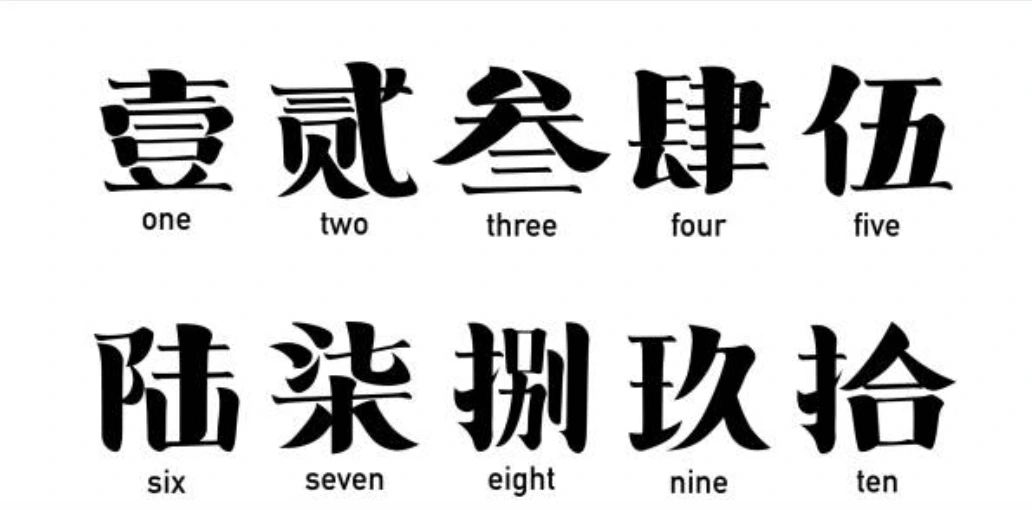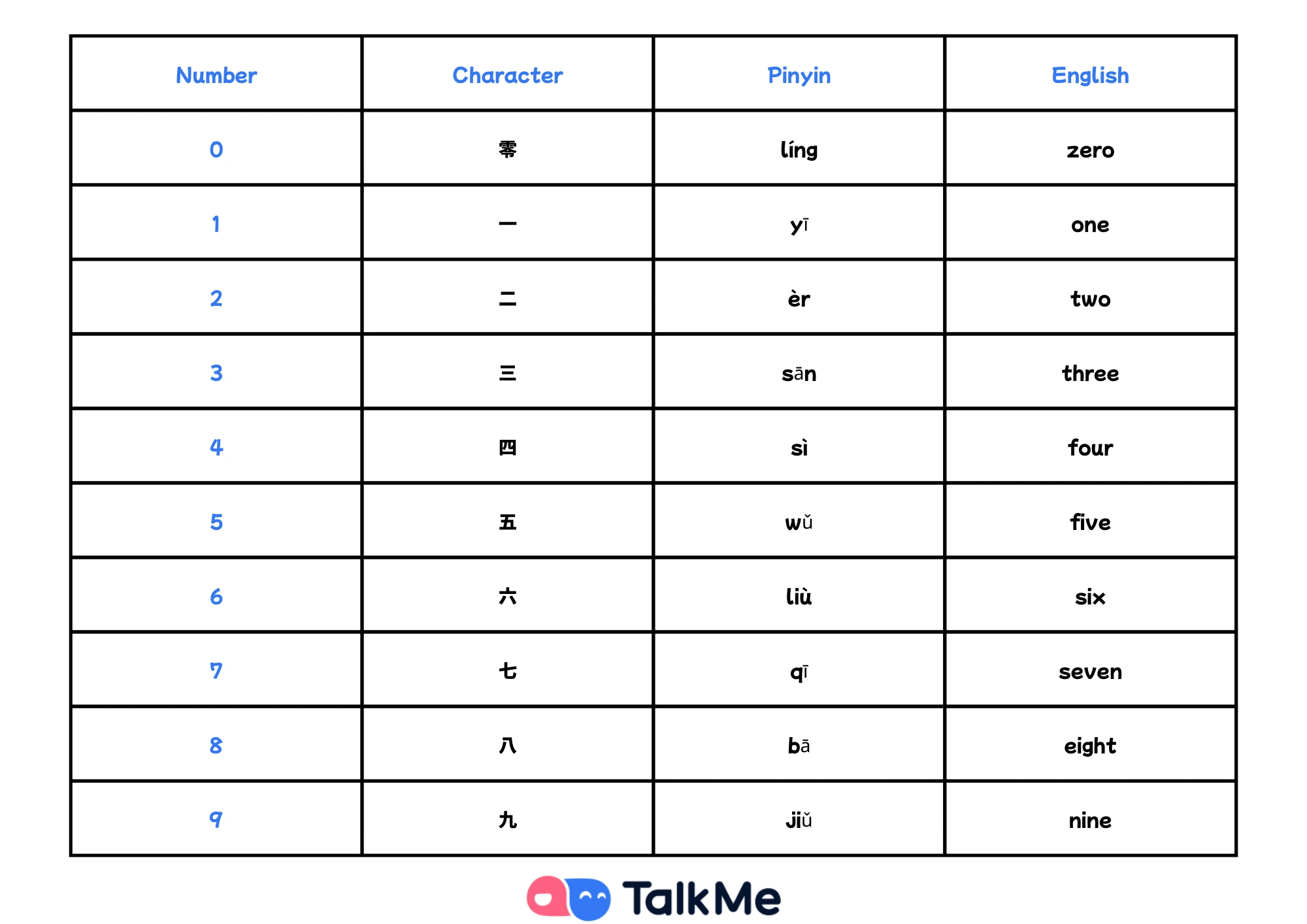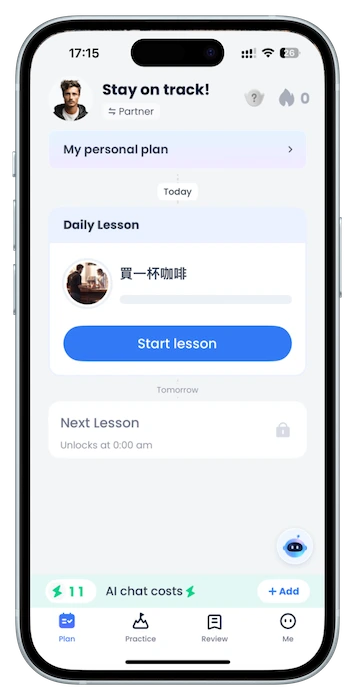Numbers are everywhere — in conversations, prices, phone numbers, addresses, and daily schedules. If you’re learning Mandarin Chinese, mastering numbers is a vital step that opens the door to real-life communication. Whether you’re shopping in Beijing, checking the time in Taipei, or confirming a phone number, understanding Chinese numbers makes life a lot easier.

In this guide, we’ll help you navigate the world of Chinese number 1 to 10,000. You’ll learn how 1-10 in Chinese works as the foundation, then gradually build up your knowledge. From idioms and slang to shopping and time-telling, we’ll cover it all.
Chinese Numbers 0–9
Here’s your essential starting point: the basic digits in Chinese.

To remember Chinese number 1, think of a single horizontal stroke. Simple and symbolic.
Numbers 10–100
Chinese numbers are wonderfully logical. To form numbers from 10 onward, you combine words for digits and tens:
10 – 十 (shí)
20 – 二十 (èr shí)
30 – 三十 (sān shí)
40 – 四十 (sì shí)
50 – 五十 (wǔ shí)
60 – 六十 (liù shí)
70 – 七十 (qī shí)
80 – 八十 (bā shí)
90 – 九十 (jiǔ shí)
100 – 一百 (yī bǎi)
Learners often skip digits or confuse word order. For example, 35 is 三十五 (sān shí wǔ), not 五十三.
Common Mistake:
Confusing 二 (èr) and 两 (liǎng). Use 二 in counting, but 两 before measure words.
Practice:
- 47 = 四十七 (sì shí qī)
- 68 = 六十八 (liù shí bā)
Numbers 100–10,000
Now let’s scale up with hundreds:
200 – 二百 (èr bǎi) [formal] / 两百 (liǎng bǎi) [casual]
300 – 三百 (sān bǎi)
400 – 四百 (sì bǎi)
500 – 五百 (wǔ bǎi)
600 – 六百 (liù bǎi)
700 – 七百 (qī bǎi)
800 – 八百 (bā bǎi)
900 – 九百 (jiǔ bǎi)
536 – 五百三十六 (wǔ bǎi sān shí liù)
Numbers from 1000 – 10,000
Going higher? Just stack the logic:
1000 – 一千 (yī qiān)
2000 – 两千 (liǎng qiān)
3000 – 三千 (sān qiān)
4000 – 四千 (sì qiān)
5000 – 五千 (wǔ qiān)
6000 – 六千 (liù qiān)
7000 – 七千 (qī qiān)
8000 – 八千 (bā qiān)
9000 – 九千 (jiǔ qiān)
10,000 – 一万 (yī wàn)
Note: Chinese counts in four-digit units, so 10,000 has a unique word: 万 (wàn).
How to Say Your Phone Number in Chinese
Phone numbers in Chinese are read digit by digit, and “1” is often pronounced as yāo (幺) to avoid confusion with “7.”
Example: 13094250637 → 一三零 九四二 五零六 三七
or 一三零 九四二 五零六 三幺
Try both formats and listen for them in native conversations.
Talking About Prices
Chinese currency basics:
- 元 (yuán) – like “dollar”
- 毛 (máo) – 1/10 of a yuan (like a dime)
- 分 (fēn) – 1/100 of a yuan (like a penny)
Examples:
- 15元 = 十五块 (shí wǔ kuài)
- 8.50元 = 八块五毛 (bā kuài wǔ máo)
Use these in markets or restaurants.
Numbers in Shopping Phrases
Want to bargain in Mandarin? You’ll need numbers.
Asking for Quantity:
- 你要几个?(nǐ yào jǐ gè?) – How many do you want?
Discussing Price:
- 这个多少钱?(zhè gè duō shǎo qián?) – How much is this?
Bargaining:
- 太贵了!(tài guì le!) – Too expensive!
- 可以便宜一点吗?(kě yǐ pián yí yī diǎn ma?) – Can you make it cheaper?
Scenario:
- A: 这个十五块。
- B: 太贵了,十块可以吗?
Expressing Time in Chinese
To tell time in Mandarin:
- 小时 (xiǎo shí) – hour
- 分 (fēn) – minute
- 秒 (miǎo) – second
Examples:
- 3:15 – 三点十五分 (sān diǎn shí wǔ fēn)
- 6:30 – 六点半 (liù diǎn bàn)
- Almost 8 – 快八点了 (kuài bā diǎn le)
Ask time with: 现在几点?(xiàn zài jǐ diǎn?)
Fun with Chinese Number Idioms and Slang
Chinese is rich with number idioms:
- 一心一意 (yī xīn yī yì) – wholeheartedly
- 三心二意 (sān xīn èr yì) – half-hearted
- 四面八方 (sì miàn bā fāng) – everywhere
China number one (中国第一) is a phrase often used in prideful or humorous contexts.
Lucky Chinese numbers:
- 8 (八 bā) – wealth and prosperity
- 6 (六 liù) – smoothness or good luck
- 9 (九 jiǔ) – longevity
Unlucky number:
- 4 (四 sì) sounds like “death” (死 sǐ)
Learn Chinese Numbers with TalkMe AI
Want to truly master Chinese numbers? TalkMe AI is your ideal learning companion.

Here’s how:
- Real-world scenarios: Practice shopping, telling time, or discussing prices.
- Pronunciation feedback: Get instant help on tones and clarity.
- Grammar support: Know when to use 两 vs 二.
- Roleplay with AI tutors: Simulate everyday conversations.
- Bonus phrase: Say 谢谢 – 谢谢 (xiè xie) or 多谢 (duō xiè). Pair it with a number: “Thank you so much!” – 谢谢你一百次!(Thank you 100 times!)
最后的话
来自 Chinese number 1 至 一万, numbers unlock daily communication. You’ve learned how to count, bargain, tell time, and use idioms.
与 TalkMe AI, you can dive deeper, speak smarter, and grow your Mandarin naturally.



